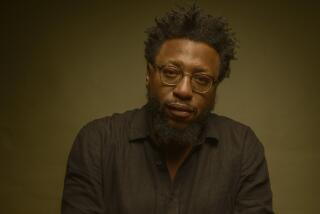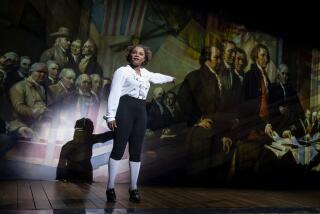BOOK REVIEWS : Brilliant, Genteel, Hopeless Adams
- Share via
Henry Adams by Ernest Samuels (The Belknap Press of Harvard University Press: $25; 504 pages).
“Porcupinus Angeliscus,” Secretary of State John Hay called Henry Adams, his gossip, walking companion, close friend, and co-owner of the double mansion across from the White House which stands today as the Hay-Adams Hotel.
“The fox knows many things; the porcupine knows one thing well,” Sir Isaiah Berlin wrote. All his long life--1838 to 1918--Adams bore a porcupine’s head upon a fox’s skibbling legs. They trotted him restlessly from mastery to mastery without ever staying long enough to move in.
Classical historian, philosopher of history, political insider, novelist, professor, muckraking editor, conversationalist, husband, grand Platonic (though unwillingly) lover, epicure, puritan and, for a year, a fastidious South Seas drifter: Adams was all these things, many of them with brilliance. Yet they all eluded him or, more accurately, he eluded all of them. When his brother, Charles Francis Adams Jr., asked his help in preparing a biography of their father, he replied:
“Make any use of me that you like just as though I were real.”
Fourth in a line of famous Adamses--John, John Quincy, Charles Francis--Henry angrily struggled with the family curse of being so high-minded as to reach a summit and then drift off upwards. He ran all the races, and well enough to win; but because he could not allow himself to want the prize, he never quite ran any race at all.
Except one, and that one without running. He wrote some of the most extraordinary sentences in American letters. His genius was a series of specific and powerful brilliancies that glitter in his best books and particularly in his collected letters. He was a master miniaturist who attempted murals and got lost.
Even “The Education of Henry Adams,” which carries along wonderfully for awhile, sinks struggling into its own quicksand of high-reaching and half-articulated thought. William James wrote Adams to commend the early parts of the book. But, he added cautiously, “a great deal of the later diplomatic history is dealt with so much by hint and implication that to an ignoramus like W. J. it reads obscurely.”
Ernest Samuels, who had spent his life on Adams’ life, makes a spectacular effort to assay and describe the cloudy convolutions of such speculative works as “Mount Saint Michel and Chartres,” and of Adams’s theories on history. Sometimes, as with a long and devoted marriage, the features of Samuels’ writing come to resemble those of its subject, both in its witty pinpointing and in its clouds. But even he tells us finally--and it reflects Adams’s own unsleeping self-awareness:
“Adams could not either state his problem or wholly know what he himself meant.”
Samuels’ three-volume biography was powerful and artful scrutiny of the man who doubted he was real. It is a classic, but three volumes in this case may itself constitute a kind of practical unreality. Now the biographer has condensed and refined his work into one volume, benefitting from additional material that has come to light.
It starts off, appropriately, with a high-minded refusal. As a child, Henry observed his grandfather, John Quincy, declining to attend a Boston banquet for President Tyler. It was a protest against Tyler’s slave-holding; even more, it was a slap in the face of the Boston financial Establishment for its complaisance towards slave-holding interests.
Always a virtuous remnant, the Adamses were never at ease even in the city that most of us associate them with. Henry could not even abide its virtues--nor ever quite get away from them. He called Boston “a provincial city in which intellectual life has foundered in moral earnestness.” All his life he worked, not really successfully, to strip himself of what he called “my Bostonianism and finikin clinging to what I think best.” When Harvard tried to give him an honorary doctorate, he wriggled and temporized and introduced so many caveats before refusing, that finally President Charles Elliot wrote stiffly reminding him that “You are not conferring the degree on yourself--it is the act of the University.”
It epitomized his brilliant, hopeless, comical and rather grand pursuit of a three-legged contradiction: to be an Adams, to make a mark on a brawling, vulgar United States, and to infuse this cigar-chewing, money-grubbing, immensely vital country with the spiritual and cultural values of European civilization. It made him alternately reach out and pull back, whether as a Washington insider-outsider or as a celebrator of old-world sophistication and political dialectic. He managed to be an aesthete on close terms with the likes of Bernard Berenson, to be a parlor Marxist, and to be a genteel conspirator for Cuban independence. “Come and revolute Cuba,” he wrote to Hay--not yet in the government--at one point.
In Washington, his salon was a privileged window on national politics. Everyone came by to tell him things. At the same time, along with his wife, Clover--until she killed herself in an access of depression--Mr. and Mrs. Hay, and several others of the elect, he set standards for snobbishness. Even President Rutherford Hays found himself snubbed one day when he walked over to join Henry and several of his friends.
Samuels’ volume gets in all in, along with Adams’s travels, his writings, and the long unconsummated love affair, after his wife’s death, with Elizabeth Cameron, another Washington grande dame. She sent him away, called him back, she would and she wouldn’t. Finally, she didn’t. Possibly this was to his relief; he wrote her with melancholy wit: “I am not old enough to be your tame cat. You are too old to accept me in any other character.”
Perhaps wit--melancholy, choleric, exhilarated--was, after all, his true passion and bedrock reality. Certainly his letters, from which Samuels quotes generously and well, demonstrate it. This one-volume compression calls urgently for another: a selection of letters from Harvard University Press’s six-volume set.
More to Read
Sign up for our Book Club newsletter
Get the latest news, events and more from the Los Angeles Times Book Club, and help us get L.A. reading and talking.
You may occasionally receive promotional content from the Los Angeles Times.










